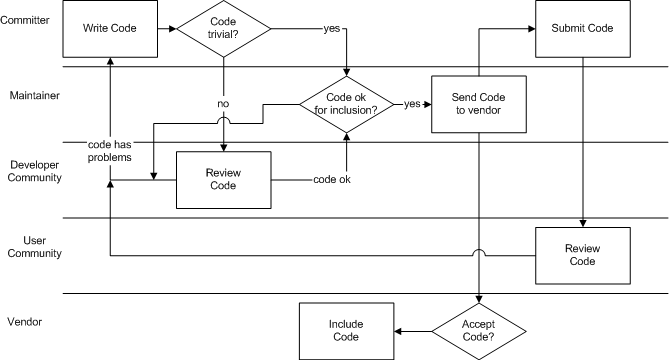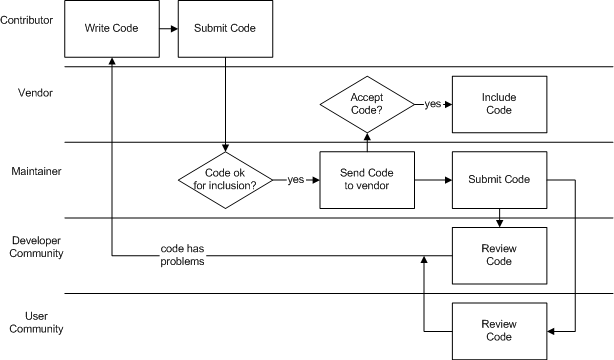6.3. Committing code
The committing of new or modified code is one of the most frequent processes in the FreeBSD project and will usually happen many times a day. Committing of code can only be done by a “committer”. Committers commit either code written by themselves, code submitted to them or code submitted through a problem report.
When code is written by the developer that is non-trivial, he should seek a code review from the community. This is done by sending mail to the relevant list asking for review. Before submitting the code for review, he should ensure it compiles correctly with the entire tree and that all relevant tests run. This is called “pre-commit test”. When contributed code is received, it should be reviewed by the committer and tested the same way.
When a change is committed to a part of the source that has been contributed from an outside Vendor, the maintainer should ensure that the patch is contributed back to the vendor. This is in line with the open source philosophy and makes it easier to stay in sync with outside projects as the patches do not have to be reapplied every time a new release is made.
After the code has been available for review and no further changes are necessary, the code is committed into the development branch, -CURRENT. If the change applies for the -STABLE branch or the other branches as well, a “Merge From Current” ("MFC") countdown is set by the committer. After the number of days the committer chose when setting the MFC have passed, an email will automatically be sent to the committer reminding him to commit it to the -STABLE branch (and possibly security branches as well). Only security critical changes should be merged to security branches.
Delaying the commit to -STABLE and other branches allows for “parallel debugging” where the committed code is tested on a wide range of configurations. This makes changes to -STABLE to contain fewer faults and thus giving the branch its name.
When a committer has written a piece of code and wants to commit it, he first needs to determine if it is trivial enough to go in without prior review or if it should first be reviewed by the developer community. If the code is trivial or has been reviewed and the committer is not the maintainer, he should consult the maintainer before proceeding. If the code is contributed by an outside vendor, the maintainer should create a patch that is sent back to the vendor. The code is then committed and the deployed by the users. Should they find problems with the code, this will be reported and the committer can go back to writing a patch. If a vendor is affected, he can choose to implement or ignore the patch.
The difference when a contributor makes a code contribution is that he submits the code through the send-pr program. This report is picked up by the maintainer who reviews the code and commits it.
Hats included in this process are:

